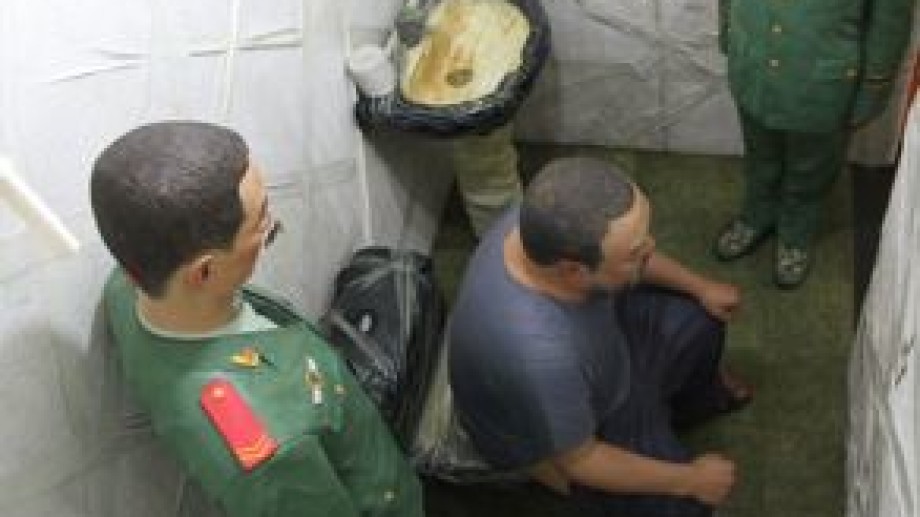 |
|
A scene from Andreas Johnsen's Ai Weiwei: The Fake Case.
Chinese artist Ai Weiwei is popping up on the big screen again, this time courtesy of Danish filmmaker Andreas Johnsen whose doc Ai Weiwei: The Fake Case had its World Premiere here at the International Documentary Film Festival Amsterdam (IDFA), which continues through the Thanksgiving holiday.
Named the world's most powerful artist last year by ArtReview magazine, Ai Weiwei has long clashed with the establishment in Beijing where he lives, works and is currently under a soft house arrest. Alison Klayman's 2012 doc Ai Weiwei: Never Sorry chronicled the artist's exhibitions and various confrontations with Chinese authorities in often humorous moments. The film, however, left on a bit of a dark note as Ai was arrested on charges of tax evasion and spent time in detention. Johnsen's film appears to pick up soon after Ai Weiwei's release from jail (authorities have charged him with evading $2.5 million in taxes). Shaken after his ordeal, the artist uncharacteristically turns down interviews and speaks in softer tones. His usual feistiness, however, reverts over the course of the feature as he confronts police who constantly monitor him and in one particularly fiery scene, he bursts out of his Beijing compound to face down a Chinese security agent who roughed up one of his protégés.</p>
“Ai Weiwei has a big following in China and the authorities are afraid that he'll become a focal point for people who want change in China,” said Johnsen following a screening of his film at the ornate Tsuchinski Theater in Amsterdam. “He has a huge amount of followers online, especially young people and this is what they're afraid of. They were afraid that during the Jasmine Revolution [in Tunisia] that the same thing would happen in China, so that is why they put him away.” Johnsen said he persuaded Ai Weiwei to allow him to film after many initial requests were denied. Eventually, the filmmaker succeeded in getting permission from the artist after sending a package of his past films. Ai Weiwei is a fan of the non-fiction genre as well, having made a number of documentaries, which he has released via the internet.

Ai Weiwei: The Fake Case director Andreas Johnsen speaking at IDFA this weekend.
“Hopefully the film can spread awareness of the situation in China about people whose opinions are different than those of the authorities,” added Johnsen. “I'd like that it spread more awareness about his case so that the government will be [compelled] to give him back his passport and give him his full freedom. Since he's under so much surveillance and his film is tapped and his email is checked, I don't think there's anything in this film that the authorities don't already know.”
Though Ai Weiwei could not travel to IDFA because of his current quasi- house arrest, he “appeared” at the theater via a taped message to the audience following the screening. His short update follows:
“Thanks to Andreas for his film. He came to China many many times. He's very passionate and has a lot of curiosity. We've become friends and we spent a lot of time together. We ate, played and discussed a lot of issues about film and have become very close.
My current situation in Beijing is still under a soft detention. This started many, many years ago. For a certain period of time, I didn't even realize that. After my secret detention in 2011, it has become more harsh. I have a one year probation. These restrictions haven't come from a traditional process, but rather it's like [a verbal] grin and bare it. I still cannot travel and cannot get on domestic internet and cannot have art shows in China, though I can have technical help to work. I can have international communications and do art shows outside of China. The new government has been in [power] for over a year, but I have not seen a change in my condition. They have still kept my passport and there's still no real communication between me and [other dissidents]. They are still putting people in jail and have not shown a different attitude. I don't see a possibility for a change.
The whole system is built on this foundation that does not allow people to freely express themselves and freely exercise their own rights. I'm happy Andreas' film can be shown and I hope it will become successful… And good bye.

Ai Weiwei appearing via a taped message at IDFA from Beijing.
Johnsen talked about the possibility of Ai Weiwei: The Fake Case being seen in China, though he said that obviously anything of an official nature would be impossible. He hopes to access what he described as lively underground cinema culture in the capital and other cities in the country as well as the internet.
As the discussion closed out, the festival's moderator suggested that perhaps someone from China's Security Agency was in the theater at that moment and could “help arrange a premiere.” And with that, the audience laughed and applauded while Johnsen smiled and shook his head.



